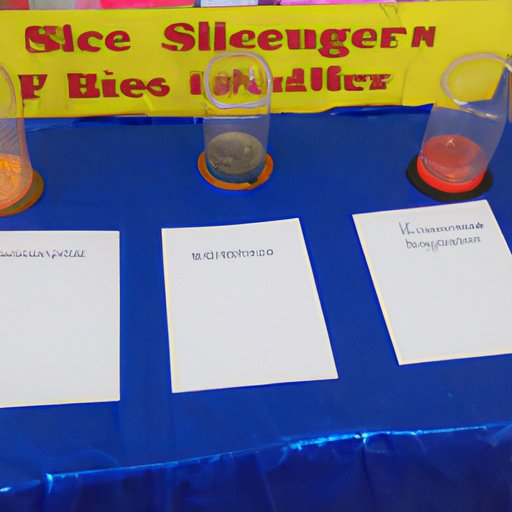Introduction
A science fair project is an opportunity for students to explore a scientific topic of their choice. It involves researching a topic, developing a hypothesis, conducting experiments, analyzing data, and drawing conclusions. Participating in a science fair project can be a great learning experience and help students develop important skills such as problem solving, critical thinking, and communication.

Common Types of Science Fair Projects and How to Choose the Right One
When choosing a science fair project, it’s important to pick a topic that is interesting and engaging. Some common types of science fair projects include biology and ecology projects, physics and engineering projects, chemistry projects, and earth science projects.
Biology and Ecology Projects
Biology and ecology projects involve studying living organisms and their environment. Examples of possible topics include examining the effects of different fertilizers on plant growth or exploring how light affects the growth of algae.
Physics and Engineering Projects
Physics and engineering projects involve studying physical laws and principles. Possible topics include investigating the effects of friction on the speed of a toy car or exploring the relationship between the mass and acceleration of a moving object.
Chemistry Projects
Chemistry projects involve studying the properties of chemical substances. Possible topics include investigating the reaction between different acids and bases or exploring the effect of temperature on the rate of a chemical reaction.
Earth Science Projects
Earth science projects involve studying the planet and its environment. Possible topics include examining the effects of climate change on animal populations or exploring the relationship between soil composition and plant growth.
Steps for Successfully Completing a Science Fair Project
Once a student has chosen a topic for their science fair project, they should follow these steps for success:
Research and Plan Your Project
Before beginning any science fair project, it’s important to research the topic thoroughly. Students should read books, articles, and other resources to learn more about the subject and develop a plan for their project.
Develop a Hypothesis
After researching the topic, students should develop a hypothesis, which is an educated guess about what will happen during the experiment. For example, if a student is investigating the effects of fertilizer on plant growth, their hypothesis might be “Fertilizer will increase the growth of plants.”
Conduct Experiments
Next, the student should conduct experiments to test their hypothesis. This may involve growing plants with different levels of fertilizer, measuring acceleration of a toy car on different surfaces, or testing the rate of a chemical reaction at different temperatures.
Analyze and Interpret Data
Once the experiments are complete, the student should analyze and interpret the data. This may involve calculating averages, making graphs, or writing reports.
Draw Conclusions
Based on the data, the student should draw conclusions about the results of their experiment. This may involve determining whether the hypothesis was correct or incorrect, or if further experimentation is needed.
Create a Presentation
Finally, the student should create a presentation to share the results of their project. This may involve creating a poster board, giving an oral presentation, or creating a website or video.
Advice from Science Fair Winners on Crafting an Award-Winning Project
The following tips from past science fair winners can help students create an award-winning project:
Utilize the Scientific Method
The scientific method is a process used to answer questions and solve problems. Following this method can help students organize their project and ensure that all the necessary steps are completed.
Present Results Clearly and Creatively
Students should present their results clearly and creatively so that judges can easily understand the project. This may involve creating colorful charts and graphs, using visuals such as photographs or videos, or incorporating technology such as virtual reality or 3D printing.
Use Technology to Enhance Your Project
Using technology can help students take their project to the next level. This may involve using computer simulations to visualize data, building robots to conduct experiments, or using virtual reality to demonstrate results.

Ideas for Unique Science Fair Projects That Will Wow Judges
Although some science fairs have specific requirements, there are also many opportunities for students to come up with their own creative ideas. Some unique science fair projects include:
Robotics Projects
Robotics projects involve building and programming robots to complete tasks. Examples of possible projects include designing a robot to sort objects by color or creating a robot arm that can pick up and move objects.
Alternative Energy Projects
Alternative energy projects involve exploring different sources of renewable energy. Examples of possible projects include building a solar powered car or investigating the efficiency of different wind turbine designs.
Environmental Projects
Environmental projects involve studying the natural world and ways to protect it. Possible topics include examining the effects of ocean acidification on marine life or exploring ways to reduce air pollution.
Conclusion
A science fair project is a great way for students to explore a scientific topic of their choice. By participating in a science fair project, students can gain valuable skills such as problem solving, critical thinking, and communication. There are many types of science fair projects, including biology and ecology projects, physics and engineering projects, chemistry projects, and earth science projects. To successfully complete a science fair project, students should research and plan their project, develop a hypothesis, conduct experiments, analyze and interpret data, draw conclusions, and create a presentation. Advice from science fair winners includes utilizing the scientific method, presenting results clearly and creatively, and using technology to enhance the project. Ideas for unique science fair projects include robotics projects, alternative energy projects, and environmental projects.
(Note: Is this article not meeting your expectations? Do you have knowledge or insights to share? Unlock new opportunities and expand your reach by joining our authors team. Click Registration to join us and share your expertise with our readers.)
